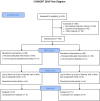Effectiveness of structured exercise program on insulin resistance and quality of life in type 2 diabetes mellitus-A randomized controlled trial
- PMID: 38771888
- PMCID: PMC11108169
- DOI: 10.1371/journal.pone.0302831
Effectiveness of structured exercise program on insulin resistance and quality of life in type 2 diabetes mellitus-A randomized controlled trial
Abstract
Objective: Impaired glucose control & Insulin resistance are reported to be risk factors for the development of cardiovascular diseases. To find the effects of a structured exercise program on insulin resistance, glycaemic control, functional capacity, and quality of life in patients with Type 2 diabetes mellitus.
Design: Randomized, controlled trial.
Setting: Diabetic Foot Clinic, Department of Physiotherapy & Department of General Medicine, Kasturba Hospital in Manipal, Karnataka, India.
Participants: 160 participants aged between 30-65 years with Type 2 diabetes mellitus.
Intervention: A set of structured exercise programs (aerobic, resistance, and combined) along with the standard hospital care was performed 3-5 times weekly for 12 weeks.
Measurements: primary outcome measures: Fasting Insulin Level, Homa-IR, Six-minute walk test (6MWT), and WHOQOL-BREF questionnaire at baseline and 12th week.
Secondary outcome measures: Body composition analysis, Fasting Blood Sugar, Postprandial Blood Sugar, Glycated Haemoglobin (HbA1c), and GPAQ questionnaire at baseline and 12th week.
Results: Significant differences have been observed in Homeostasis model assessment for insulin resistance (Homa-IR) (F (1, 144) = 89.29, p < 0.001); Fasting insulin (FI) (F (1, 144) = 129.10, p < 0.001); Fasting blood sugar (FBS) (F (1, 144) = 12.193, p< 0.001); Post prandial blood sugar (PPBS) (F (1, 144) = 53.015, p< 0.001); glycated haemoglobin (HbA1c) (F (1, 144) = 80.050, p < 0.001); WHOQOL-Physical health (F (1, 144) = 20.008, p< 0.001), Psychological (F (1, 144) = 77.984, p< 0.001), Social relationship (F (1, 144) = 44.866, p< 0.001); Environmental (F (1, 144) = 69.974, p< 0.001); Six minute walk test (6MWT) (F (1, 144) = 84.135, p< 0.001) in the study group when compared with the control group from baseline to 12th week.
Conclusions: The study reveals that a 12-week structured exercise training program effectively reduces insulin resistance, improves quality of life, enhances functional capacity, and improves glycaemic control in type 2 diabetes mellitus.
Copyright: © 2024 Amaravadi et al. This is an open access article distributed under the terms of the Creative Commons Attribution License, which permits unrestricted use, distribution, and reproduction in any medium, provided the original author and source are credited.
Conflict of interest statement
The authors have declared that no competing interests exist.
Similar articles
-
The effects of supervised aerobic training on dyslipidaemia among diabetic older patients.BMC Endocr Disord. 2024 Oct 9;24(1):212. doi: 10.1186/s12902-024-01745-8. BMC Endocr Disord. 2024. PMID: 39385223 Free PMC article.
-
Resistance Exercise Versus Aerobic Exercise Combined with Metformin Therapy in the Treatment of type 2 Diabetes: A 12-Week Comparative Clinical Study.Endocr Metab Immune Disord Drug Targets. 2021;21(8):1531-1536. doi: 10.2174/1871530320999200918143227. Endocr Metab Immune Disord Drug Targets. 2021. PMID: 32957900 Clinical Trial.
-
Exercise and insulin resistance in type 2 diabetes mellitus: A systematic review and meta-analysis.Ann Phys Rehabil Med. 2019 Mar;62(2):98-103. doi: 10.1016/j.rehab.2018.11.001. Epub 2018 Dec 13. Ann Phys Rehabil Med. 2019. PMID: 30553010
-
The effectiveness of physical leisure time activities on glycaemic control in adult patients with diabetes type 2: A Systematic Review.JBI Libr Syst Rev. 2012;10(42 Suppl):1-20. doi: 10.11124/jbisrir-2012-251. JBI Libr Syst Rev. 2012. PMID: 27820154
-
Effect of combined aerobic exercise and resistance training on postmenopausal women with type 2 diabetes: a systematic review and meta-analysis.Gynecol Endocrinol. 2025 Dec;41(1):2450338. doi: 10.1080/09513590.2025.2450338. Epub 2025 Jan 11. Gynecol Endocrinol. 2025. PMID: 39797630
Cited by
-
Effects of concurrent continuous aerobic and short rest resistance exercise training on metabolic biomarkers in type 2 diabetes patients: a systematic review and meta-analysis.Diabetol Metab Syndr. 2025 Jul 21;17(1):290. doi: 10.1186/s13098-025-01838-x. Diabetol Metab Syndr. 2025. PMID: 40691799 Free PMC article. Review.
-
Risk of Insulin Resistance: Comparison of the Commerce vs. Industry Sector and Associated Variables.Diseases. 2025 May 14;13(5):150. doi: 10.3390/diseases13050150. Diseases. 2025. PMID: 40422582 Free PMC article.
-
Comparative Effects of Exercise and GLP-1 RAs on Type 2 Diabetic Rat Model: A Systematic Review.Int J Exerc Sci. 2025 Mar 1;18(6):363-378. doi: 10.70252/FHZH8622. eCollection 2025. Int J Exerc Sci. 2025. PMID: 40190743 Free PMC article. Review.
-
On the Merits of Targeted and Individualized Physical Exercise in Persons with Diabetic Foot Disease-From Controversies to Consensus.Biomedicines. 2025 Jul 17;13(7):1752. doi: 10.3390/biomedicines13071752. Biomedicines. 2025. PMID: 40722821 Free PMC article. Review.
-
Role of Peripheral and Central Insulin Resistance in Neuropsychiatric Disorders.J Clin Med. 2024 Nov 3;13(21):6607. doi: 10.3390/jcm13216607. J Clin Med. 2024. PMID: 39518747 Free PMC article. Review.
References
-
- American Diabetes Association. 2. Classification and diagnosis of diabetes: standards of medical care in diabetes 2018. Diabetes care. 2018. Jan 1;41(Supplement 1): S13–27. - PubMed
-
- Saeedi P, Petersohn I, Salpea P, Malanda B, Karuranga S, Unwin N, et al.. Global and regional diabetes prevalence estimates for 2019 and projections for 2030 and 2045: Results from the International Diabetes Federation Diabetes Atlas. Diabetes research and clinical practice. 2019. Nov 1; 157:107843. - PubMed
Publication types
MeSH terms
LinkOut - more resources
Full Text Sources
Medical


